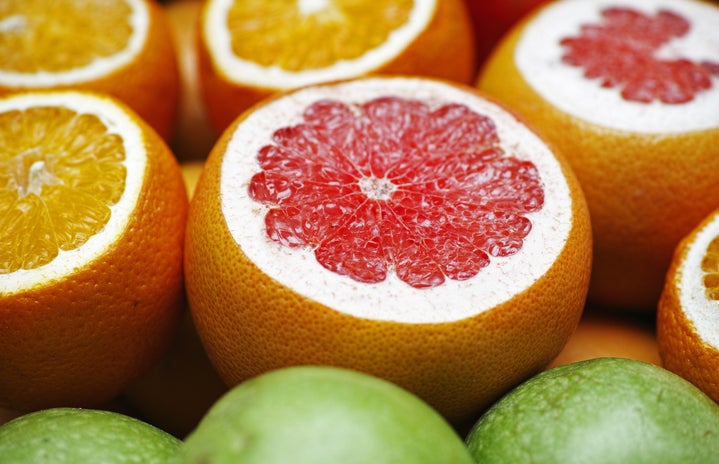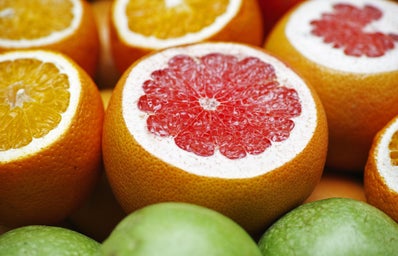The term “diet” and phrase “diet culture” has a generally negative connotation because these days it refers to a culture that is obsessed, if you will, with dieting propaganda, often imperceptibly, and it affects our relationships with not only our personal body image, but with food, our social life, our family and peers. Diet culture exists essentially to fight off the fear of death, because being “fit” and “healthy” helps prevent health issues. The problem occurs when losing weight occurs at the cost of a healthy lifestyle. Oftentimes people become so obsessed with the idea of losing a certain number of pounds, or getting that flat belly, that they forget to take care of themselves, mentally, physically, and emotionally
The most important thing going into any diet is positivity. This means having a positive body image before trying losing weight or whatever your specific goals might be. Loving yourself will get you farther than anything you try to do while hating yourself. Remember why you decided to go on this journey to better health, and if you keep asking yourself “Why?” you’ll probably end up with the answer “because I want to be happy.” So be happy! Have a positive attitude then entire length of your journey, and don’t be hard on yourself. Patience, nurture, love, and gratitude toward your body are the most important things to keep in mind while working toward your fitness and health goals.
The next question is which diet to go on. Sure, there are plenty of tea detox packs, lean meal plans, etc., but those tend to be fairly restrictive and don’t work as effectively because they are short-term plans. Fad diets aren’t meant to be long-term, and losing a lot of weight really quickly isn’t necessarily the healthiest option. The best way to approach any health and fitness goal is by first, setting goals, and then implementing sustainable lifestyle changes for more long-term, healthier affects. Here are some of the more effective “dieting” health trends you can adopt into your lifestyle to reap the benefits you desire…
Paleo (Whole30)
The Paleo diet is the diet of our ancestors pre-agriculture, so it is the only nutritional approach that works with your genes to keep you healthy, energetic, and lean. On the paleo diet you cut out dairy, grains, legumes, processed foods/sugars, starches, and alcohol. You only eat what people ate before the implementation of agriculture, which includes fruits, vegetables, lean meats, seafood, nuts and seeds, and healthy fats. The health benefits of Paleo are improved blood lipids, weight loss, and reduced pain from autoimmunity. This diet can be a long-term lifestyle choice, rather than just doing it for a few weeks, which you can do of course. The Whole30 program was designed based off the paleo diet as sort of a reset to a healthier diet and lifestyle. Basically, you eat paleo for 30 days with the guide of a cookbook to reap the benefits of the diet, and then once your diet is reset, you carry on your way, with the hopes of you implementing anything you’ve learned through that small journey. It’s a great way to introduce yourself to the paleo diet.
vs.
Ketogenic Diet
The ketogenic diet (keto) is a diet that essentially completely cuts out carbs and sugars. The goal of the keto diet is to consume only 20 grams or less of carbs each day, and only eat foods that are high in fats. These foods include meats, fatty foods, eggs, butter and cream, cheese, nuts and seeds, healthy oils, avocados, low-carb veggies (typically the ones that grow above the ground), and condiments. Notice that fruit is not included in this diet, as they are high in carbohydrates! Eating foods high in fat may seem unhealthy, but when you eliminate carbs from your diet and only consume fats, your body is actually put into a metabolic state (ketosis) in which your body’s fuel supply switches to the fats you’re consuming, potentially making your body a fat-burning machine. The benefits of this diet include weight loss, less hunger and cravings, and sustained energy. With the consultation of your doctor, this diet may be implemented long-term.
Meal Prep
Meal prepping perfect for anyone who is always on the go and often has little time for meals throughout the day. Meal prepping is a great way to control your eating schedule, proportions, and caloric intake. There are a plethora of plans for meal prepping, based on certain foods you want to eat or eliminate, calorie counts, etc. The prep part only takes a few hours, so getting everything ready for the week on a lazy Sunday is the perfect way to save you time throughout the week, as well as keeping you accountable to staying on a healthy diet. This eliminates any room to grab unhealthy snacks when you’re hungry throughout the day, because you’ll have a healthy meal or snack all ready for you.
Recommended: Maren Johnson: CHAARG Ambassador
Anti-Inflammatory Foods
“Anti-inflammatory” refers to a diet rich in fiber, helping to reduce inflammation by supplying anti-inflammatory phytonutrients that naturally occur in fruits, vegetables, and other whole foods. It also provides steady energy and ample vitamins and minerals, essential fatty acids, fiber and protein. There are plenty of anti-inflammatory cookbooks out there, but the gist of the diet is to eat more whole grains, avoid saturated fats and oils, get your protein mostly from fish, high quality natural cheese and yogurt, aim for 40 grams of fiber each day, and eat lots of different fruits and vegetables for their phytonutrients.
Coconut Oil
Coconut oil seems to be all the rage these days, and with good reason! The oil is extracted from the meat of a mature coconut and harvested from the coconut palm. It has many applications and health benefits. It can be used for skin and hair care. It is good for heart health, weight loss, and helps to strengthen your immune system. It has healing qualities, improves digestion, controls blood sugar levels, improves insulin secretion to prevent diabetes, and also helps improve brain function and memory. Basically, use coconut oil in everything! Put a teaspoon of coconut oil in your morning cup of black, cook with coconut oil instead of butter or canola oil, substitute coconut oil when baking, etc.
Clean Eating
Farmer’s Markets and organic eating has become very popular over the past few years. People like to know where their food is coming from, that what they’re eating is authentic. It’s also really nice to know all the ingredients in your foods, to know exactly what you’re putting into your body. Shop local, shop organic, eat fresh, live healthy. Clean eating is the first step to a happier stomach, body, and mind.
Power Bowls
Power Bowls are popular and great because you can pack everything nutritious and into one bowl. You can pack in whole grains, protein, veggies, whatever, so they taste great and are great for you. There are so many great recipes out there for breakfast bowls and lunch/dinner bowls.
The most important thing about any diet or lifestyle change is that you are doing it for the right reasons. Love and take care of yourself. Nurture your body, and be patient as well. Any progress is good progress. And know you’re not alone. Groups like Belmont CHAARG offer a supportive community for women on campus striving to be their healthiest selves. Remember, losing weight fast is great and all, but steady progress and long-term results is much healthier and beneficial to you. Carry on and eat well!
Make sure to like HC Belmont on Facebook, follow us on Twitter, pin with us on Pinterest, and love us on Instagram!

